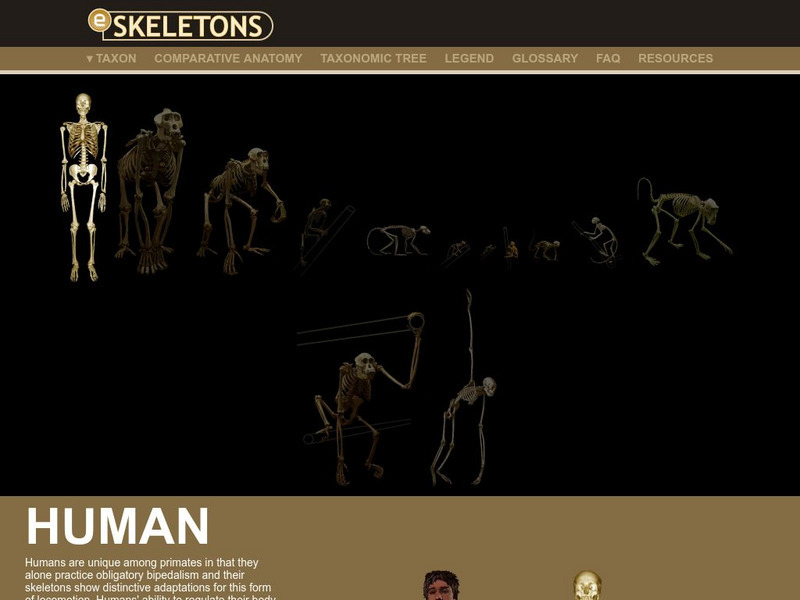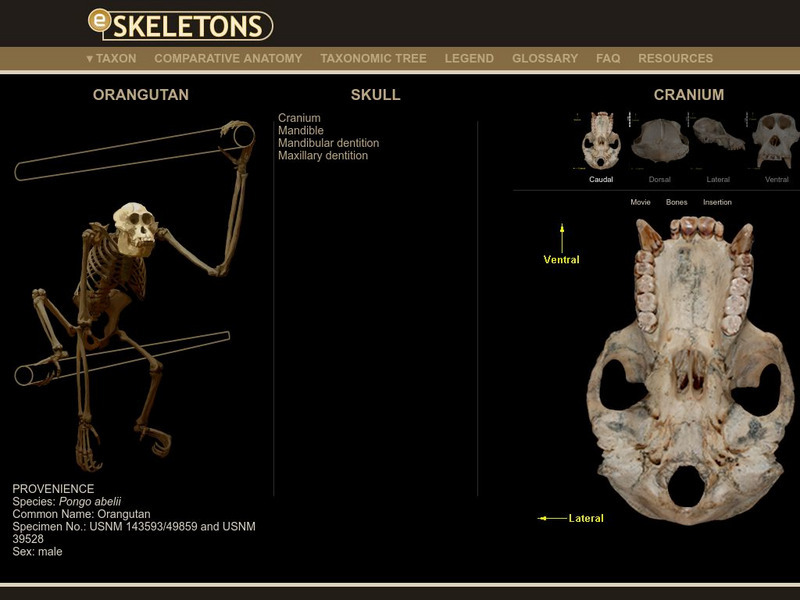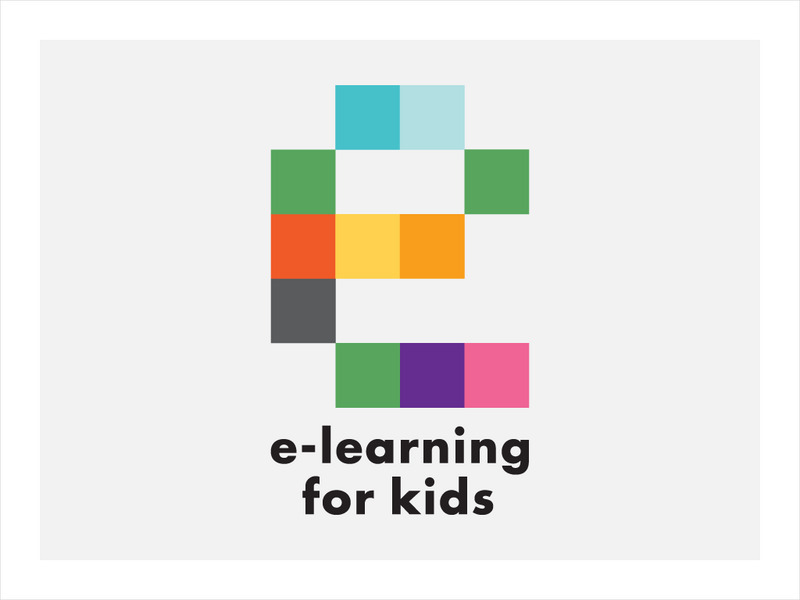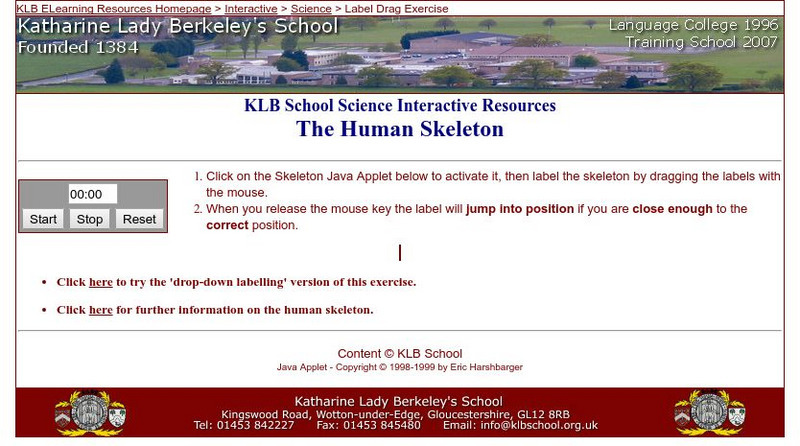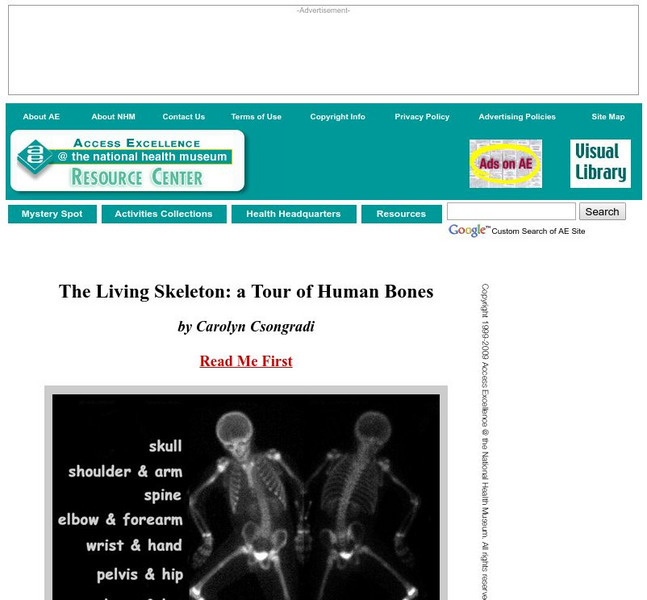Hi, what do you want to do?
Curated OER
Learning Bird Traits
Students draw and label a bird. In this bird traits instructional activity, students learn what traits make a bird different from other animals. Students are taught how to draw a bird and are expected to label the various body parts they...
Curated OER
AUSTRALIA
Students examine the different types of barrier reefs and how they are formed. In this barrier reef lesson plan students complete several activities on coral reefs.
Curated OER
Skeletal System
Students discuss the need for humans to have a skeletal system and what would happen if we did not have bones. In this skeletal system lesson, students label each bone in the human skeletal system as a group, and then...
Curated OER
The Skeletal System - Bones
Seventh graders identify the common bones in the human body. In this biology instructional activity, 7th graders research two bones assigned to them. They explain why bones are important to us.
Curated OER
The Great White Shark
In this online quiz worksheet, students answer a set of trivia questions about the Great White Shark. Page has a link to submit answers for review.
Curated OER
Coral Bleaching in the Caribbean
Students use authentic satellite data on the NASA website to determine when the sea surface temperature meets the criteria to induce coral bleaching.
Curated OER
Exploring Life in the Coral Reef
Learners study life forms in coral reefs. In this ocean life lesson plan, students study life in coral reefs as they create a coral reef sculpture.
OpenStax
Open Stax: Embryonic Development of the Axial Skeleton
The axial skeleton begins to form during early embryonic development. However, growth, remodeling, and ossification continue for several decades after birth before the adult skeleton is fully formed. Knowledge of the developmental...
OpenStax
Open Stax: Development of the Appendicular Skeleton
Learn here about the development of the appendicular skeleton - the appendicular skeleton arises from mesenchyme, a type of embryonic tissue that can differentiate into many types of tissues, including bone or muscle tissue.
eSkeletons
E Skeletons Project
Funded by the National Science Foundation, the eSkeletons Project provides interactive views of bones. Various menus allow you to review the bones of the human skeleton and compare them to the bone structures of nine primates.
National Health Museum
Access Excellence: A Tour of the Human Skeleton
Click on the interactive skeleton and see actual X-rays of different bones. Compare normal bone x-rays with x-rays of damaged bones.
eSkeletons
E Skeletons: Slow Loris
This digital laboratory provides an interactive environment in which to examine and learn about skeletal anatomy, in particular the skeleton of the slow loris.
eSkeletons
E Skeletons: Lesser Bushbaby
This digital laboratory provides an interactive environment in which to examine and learn about skeletal anatomy, in particular the skeleton of the lesser bushbaby.
eSkeletons
E Skeletons: Gibbon
This digital laboratory provides an interactive environment in which to examine and learn about skeletal anatomy, in particular the skeleton of the gibbon.
eSkeletons
E Skeletons: Orangutan
This digital laboratory provides an interactive environment in which to examine and learn about skeletal anatomy, in particular the skeleton of the orangutan.
eSkeletons
E Skeletons: Ruffed Lemur
This digital laboratory provides an interactive environment in which to examine and learn about skeletal anatomy, in particular the skeleton of the ruffed lemur.
British Council
British Council: Learn English Kids: Make a Skeleton [Pdf]
Cut out the parts and fasten them together to make a skeleton.
BiologyWise
Biology Wise: Information About the Hydrostatic Skeleton
Explains what a hydrostatic skeleton is and the types of organisms that have one. Describes examples from six phyla and the advantages and disadvantages of this type of skeleton.
PurposeGames
Purpose Games: Axial and Appendicular Skeleton Parts Quiz
41 question quiz relates to medical terms associated with the axial and appendicular skeleton.
Science Struck
Science Struck: Lucy: The First Hominid Skeleton
Read about the archaeologists who discovered the first Hominid skeleton and other ancestors of humans.
Museums Victoria
Melbourne Museum: Meet the Skeletons: Deinonychus Antirrhopus
Deinonychus antirrhopus was a small, carnivorous theropod dinosaur from the Cretaceous Period, first discovered in the United States. A study of its skeleton revealed that it was fast-moving, which went against previously held beliefs...
E-learning for Kids
E Learning for Kids: Science: Mexico: What Is a Skeleton?
Isabel celebrates the Day of the Dead in Mexico, for which many people dress up like skeletons. She wants to teach her brother Carlos about the skeleton and some different bones. This interactive module helps young learners understand...
Other
Katharine Lady Berkeley's School: The Human Skeleton
This is an interactive exercise where students drag labels to the various bones of a skeleton as a timer counts the seconds. There are two links at the bottom of the page that take you to another page with a labeling exercise, and a...
National Health Museum
Access Excellence: The Living Skeleton: A Tour of Human Bones
Take a tour of the human skeleton and see computer images of various bones of the body, including the normal bone and bones that have anomalies.
Other popular searches
- Dinosaur Skeletons
- Rodent Skeletons
- Animal Skeletons
- Skeletons Using Toothpicks
- Skeletons Joints
- Human Skeletons
- Skeletons Make a Skeleton
- Poems Skeletons
- Skeletons and Teeth
- Skeletons K 3
- Dino Skeletons
- Hamsters Skeletons














